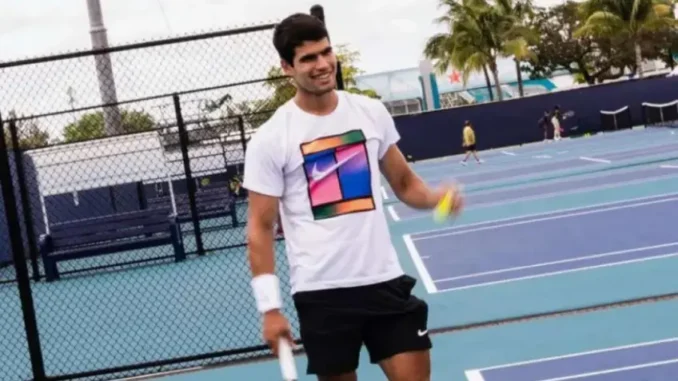
In the high-stakes world of professional tennis, where every forehand and sponsorship deal can shape a legacy, Carlos Alcaraz has emerged as a global superstar. At just 21, the Spaniard has clinched four Grand Slam titles, including the 2022 US Open and the 2024 French Open, and held the world No. 1 ranking at a record-breaking 19. Yet, behind his dazzling success lies a story of unwavering dedication—not just from Alcaraz, but from his agent, Albert Molina, whose personal sacrifices have been pivotal in guiding the young prodigy to greatness. Molina’s journey, revealed in a gripping Netflix docuseries, Carlos Alcaraz: My Way, paints a poignant picture of the costs of nurturing a champion.
Molina first spotted Alcaraz’s potential at age 11, a “skinny kid who did a lot of things well,” he recalls. By 12, Molina had convinced Alcaraz’s father, Carlos Sr., to entrust him with the boy’s career, a bold move that raised eyebrows given the youngster’s age. “At first, he had doubts, he was surprised to have a representative for his son at 12 years old,” Molina reflects, but his vision for Alcaraz’s future won over the family. Since then, Molina has been a constant presence, orchestrating everything from sponsorships with Nike and Rolex to protecting Alcaraz from the pressures of fame. His role extends beyond that of a typical agent; he is a mentor, protector, and, at times, a surrogate father figure. “I care so much about Carlos that I’d rather fail professionally than have him turn around one day and say, ‘Damn, I wasn’t happy,’” Molina confesses, revealing the depth of his emotional investment. “That would destroy me. Big-time.”
This devotion, however, has come at a steep personal cost. Molina, a father of two—a 16-year-old son and a 13-year-old daughter—spends months away from his family to be by Alcaraz’s side. “I have a wife, a son of 16, and a daughter of 13. I don’t see my children grow up to meet Carlos’s needs,” he shares with raw honesty. “My parents are getting older, and I can’t be there for them.” For 19 years, Molina has spent his birthday alone, often during Wimbledon, a stark reminder of the life he’s chosen. “When you’re feeling down, you think about home, about everything you’re missing,” he adds, his words underscoring the toll of his commitment. Yet, Molina remains steadfast, driven by a belief in Alcaraz’s potential to become the greatest player in history—a goal that demands sacrifices from everyone in his orbit.
Molina’s role is not without its challenges. He has clashed with Alcaraz over professionalism, notably when the young star arrived late to an obligation, prompting a rare outburst. “That day I got very angry with him, but not because of punctuality,” Molina explains. “It was a lack of respect towards other people, and that’s what I cannot tolerate with Carlo. It doesn’t matter if you’re number one in the world, nobody has to wait for you.” Alcaraz, chastened, acknowledged his mistake: “I’m in a position to lower my head and take the hits. The good thing is that I know it.” Such moments highlight Molina’s role as a disciplinarian, ensuring Alcaraz remains grounded despite his meteoric rise.
Beyond managing schedules, Molina shields Alcaraz from external pressures, from opportunistic fans to media scrutiny. “One of the worst parts of my job has to do with rejecting communication with some people or sectors interested in Alcaraz,” he says, wary of those who might exploit the player’s “noble” nature. This vigilance was evident when Alcaraz vacationed in Ibiza, a trip Molina viewed with concern. “It scares me personally, but not because of Carlos,” he notes, citing the risk of a misinterpreted photo or video tarnishing Alcaraz’s reputation. Despite these fears, Molina respects Alcaraz’s need for balance, understanding that happiness fuels his performance. “He likes to be happy,” Molina observes, a sentiment Alcaraz echoes: “I don’t want to feel like a slave to tennis.”
Molina’s sacrifices have paid dividends. Alcaraz’s team, including coach Juan Carlos Ferrero, has built a formidable structure around the player, leading to endorsements with premium brands like Louis Vuitton and BMW. Yet, for Molina, the true reward is Alcaraz’s character. “He will have to sacrifice a lot to be the best tennis player in history, but he is already number one in the ranking as a good kid,” he concludes. As Alcaraz continues his quest for greatness, Molina’s unwavering support—forged through years of personal sacrifice—remains the backbone of a career that promises to redefine tennis.
Leave a Reply